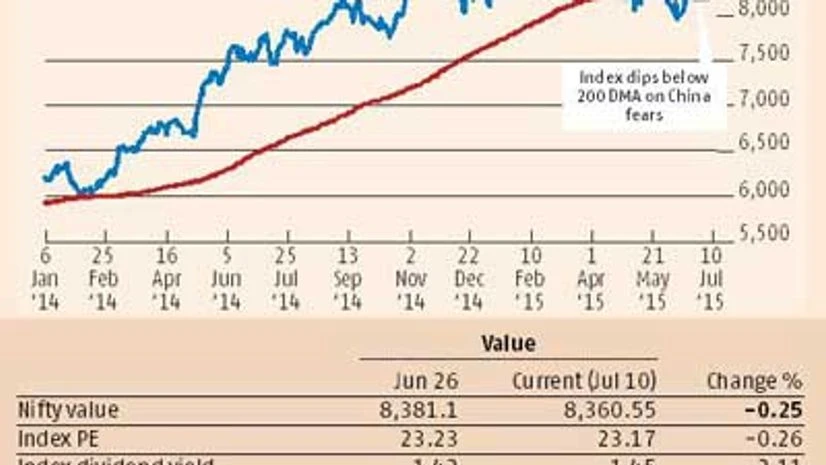As market watchers had been fearing, Greece and China delivered a double whammy. But trading ended last Friday on a note of cautious optimism. After the Greek referendum verdict of "No" crystallised a higher probability of Grexit, negotiations resumed with a new proposal.
Meanwhile, the Chinese authorities went through desperately creative contortions to support the market after a crash trimmed 12 times Greece's gross domestic product (GDP) off market value. Those measures appear to have stemmed the tide, at least for the time being.
Both dangers have receded but neither is off the table. If Greece stays within the European Union, it will roil markets ever so often. Assuming a new deal works out, Greece would be the gift that keeps on giving for traders who like high volatility situations.
China is a different kettle of fish entirely. The turmoil there is magnitudes more dangerous. Right now, China checks all the boxes in terms of classic big bubbles blowing up (in equities and real estate) in a large economy where GDP growth is decelerating.
The last time this happened was in the US. We are still suffering the consequences of Subprime. Of course, many details are entirely different. But the fallout from a Chinese crisis could be just as bad, given China's influence on world trade, and its somewhat less democratic governance structures. The commodity markets have already taken a massive beating. Base metals are at multi-year lows and crude has also gone south.
There has been a lot of speculation about the extent of bad loans and shady investments in the Chinese banking, and "shadow banking" system. There are also substantial share pledges outstanding from sundry Chinese promoters. Bitter experience should tell Indian traders what is likely to happen, given sharp falls in market value of the equity offered as collateral.

Under the circumstances, the best one can hope for is gradual deflation and a soft landing. But the measures taken so far may not allow that to happen. In fact, the Chinese appear to be trying to re-inflate the bubbles. That's a huge gamble, even in a command economy. Still Shanghai has clawed back some losses though more than half the market is now untraded. So, there is some relief.
The Chinese measures allow additional leverage in equity, and encourage the use of real estate at inflated prices, as collateral for buying stocks at inflated prices. What is more, the People's Bank of China has cut liquidity ratios and interest rate and offered a credit line for equity investments.
At the same time, routes for sellers have been blocked. Anybody who owns a stake of over five per cent in a company cannot sell for six months. Short sellers are liable to be arrested and paraded with shaming placards (perhaps not the latter but with the People's Republic of China you never know).
As many as 1,500 listed companies have "voluntarily" withdrawn their shares from being traded. A lot of highly leveraged positions are therefore, stuck and unable to unwind. The last time I recall a somewhat analogous situation was when the Bombay Stock Exchange went on strike in 1992. Big Bull Harshad Mehta was unable to clear his positions (and book large paper profits) and the Sensex fell 60 per cent.
In the midst of this, Janet Yellen's reiteration that the Federal Reserve will probably raise rates in 2015 was just another data-point. Indian traders have also started to focus on Q1. Tata Consultancy Services was said to have beaten "consensus". But the stock tanked, hitting a 52-week low.
Expectations for Q1 results are not high, with many brokerages suggesting that earning could continue to shrink. Edelweiss for instance, projects Sensex earnings will drop by two per cent in Q1 (April-June 2015) after falling 11 per cent in Q4, 2014-15 (Jan-Mar 2015).
Auto sales have weakened with overall growth of just 1.5 per cent in Q1. The SIAM says demand is especially soft in the rural and semi-urban customer segment. This is backed by Reserve Bank of India data that shows bank credit at 20-year lows. The index of industrial production for May was also disappointing, with a modest 2.7 per cent year-on-year increase over May 2014, and a decline in consumer goods.
Technically speaking, the Nifty and Sensex are hovering in the danger zone, just below their respective 200 day moving averages. However, if China, Greece, et al., drive a generic global recovery, a five per cent rebound could well occur. On the other hand, bad news flow could well mean a drop till the Nifty 8,000 level or even below.
Disclaimer: These are personal views of the writer. They do not necessarily reflect the opinion of www.business-standard.com or the Business Standard newspaper

)
